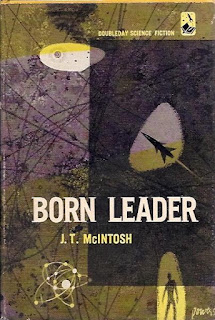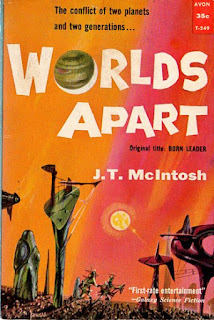a review by Rich Horton
J. T. McIntosh (real name James Murdoch MacGregor (1925-2008)) was a Scottish writer of curious interest. McIntosh began publishing SF in 1950, and was remarkably prolific for most of the next three decades, then fell silent -- only about 54 when he quit writing. The great bulk of his work was of novelette length, though he published almost 20 novels (some assembled from series of novelettes). He's a writer I find persistently interesting and persistently frustrating. He achieved a certain popularity in the '50s which diminished through the '60s. Time might have passed him by, or he might have run out of ideas, or his faults might have overwhelmed his virtues.
 |
| (Cover by Richard Powers) |
In dealing with him I must account for the fact that when I encounter a McIntosh story in an old magazine (there were no collections) I will happily read it, and also with the fact that I will often be annoyed with the stories. But -- entertained. The reasons for these facts are multiple -- for one, McIntosh really did have a smooth and engaging narrative style; and for two, he was really interested in, more than anything, social dynamics, especially as impacted by an SFnal change in circumstances. So that's good. But the problem is, he had a tendency (largely on purpose) to reduce his social speculation to a single change, amid a society otherwise indistinguisable from the Western society of the '50s. Moreover, he sometimes seemed to force his views on the effect of his SFnal change on society on the reader, instead of letting them arise (with perhaps surprises) from the external changes posited. Laid upon all that was a distinct flavor of the clichéd sexism of that time. (That said, he did feature women in prominent roles, with plenty of agency, to a degree not necessarily very common at that time.)
Put another way, McIntosh's futures, and his other worlds, were not "through-composed" -- one aspect of the world changed, and everything else was unaltered, in implausible ways. And the novel at hand, Born Leader, for all that it seems one of his better regarded earlier works, seems to me to exaggerate his faults and minimize his virtues.
Born Leader was first published by Doubleday in 1954. My edition is retitled Worlds Apart, and seems to have been issued in 1958 from Avon. Both titles are reasonable for the book.
 |
| (Cover by Richard Powers) |
Soon we learn that there is a second planet in the system, called, imaginatively enough, Secundis. (Mundis and Secundis, then, are "worlds apart".) It was colonized by a later ship, which was run in a very authoritarian and paranoid fashion. An expedition is being sent from Secundis to Mundis, with plans to conquer the latter planet. Phyllis Barton is the key character here -- a woman of influence, a lieutenant, in a society in which women are regarded almost exclusively as breeders, quite literally lesser beings. She is involved in various schemes to undermine her peers and enhance her position in the hierarchy.
So we see the main conflict of the novel: can the Mundans unite sufficiently to, in their loosy goosy way, resist the invasion of the Secundans. You hardly need ask that question without knowing the answer. You can guess some other things, like who Phyllis Barton will end up with after she realizes that on Mundis she is allowed to be a woman. And how the rigidity of Secundan society, and the paranoia engendered by it, is key to the resolution. The plot itself, while a bit featureless (much like the surface of Mundis) is fitfully interesting, particularly the escape of an older man involved in a taboo relationship with one of the younger women, and their eventual capture by the Secundans.
I have to say I liked the other early McIntosh novels I read rather more than this one. (Most particularly World Out of Mind and One in Three Hundred.) Born Leader goes on rather too long, and not enough really goes on in the novel. It bored me, and most of McIntosh's early novels, and novelettes of almost any period, avoid that. I can't really recommend it, even as I suggest that an omnibus of, say, World Out of Mind, One in Three Hundred, and a selection of a dozen or so of his best stories would be worth rediscovering.
"Rather shockingly, all the colonists are white ... and this is presented as a choice which was made and acquiesced to by the entire Earth population in order to avoid conflict in the new settlement." -- This is what I'm talking about. Does he not see how this is profoundly racist? It is, essentially, a defense of segregation.
ReplyDeleteBut yes, this sounds, as you put it, "fitfully interesting" but plagued by debilitating problems.
Yes, I was gob-smacked when I read that line. McIntosh's other works (that I recall) don't have anything so overtly racist, but they do have the passive racism by which every character (even the aliens -- who are always very humanoid) seems to be white.
DeleteThere are works where you can see that an author or director is attempting to be progressive (for the day) but still fails.
DeleteA great example is the miserable movie Five (1951) dir. Arch Oboler. The black character (who features prominently in the narrative) sacrifices himself for the white Adam and Eve couple.... blargh....
https://www.imdb.com/title/tt0043539/
Yes the black character defeats the American Nazi... but only a white future results.
Delete